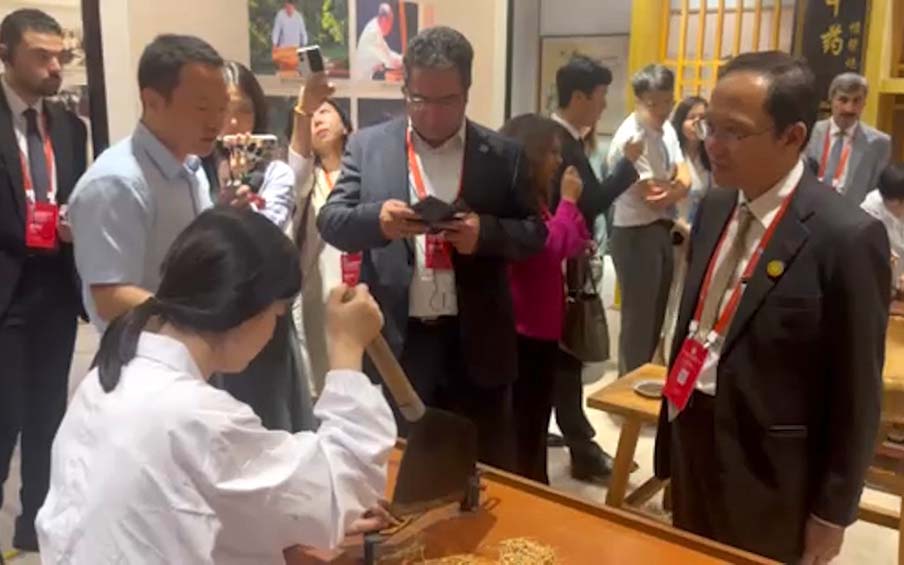Idioms are the spice of language, infusing everyday conversations with colourful expressions that often reveal more profound truths about our daily lives. In the rhythm of daily life, idioms dance through conversations, painting vivid pictures and adding layers of meaning to our interactions, making the mundane moments memorable and the mundane extraordinary.
ဆင်ကြံကြံ
/hsin gjan kjan/
• သူတစ်ပါးပျက်စီးရာပျက်စီးကြောင်းကို တိတ်တိတ်ကျိတ်ကြံသည်။
• လော်လည်ဖောက်ပြန်သောမိန်းမသည် သူ၏ယောက်ျားကို ဆင်ကြံမကြံဟုမဆိုနိုင်ပေ။
• နည်းပြ ဂွါဒီယိုလာ ဘာတွေ ဆင်ကြံကြံနေတာလဲ….
To plot like an elephant
“To plot like an elephant” refers to the belief that elephants have exceptional memories. If someone inflicts significant harm upon an elephant, it is thought to remember the incident and seek revenge when the opportunity arises.
Therefore, planning a scheme and waiting for the right moment to carry it out is likened to the behaviour of an elephant seeking retaliation.
One lesson gained from the Myanmar idiom is the concept of persistence and memory, as exemplified by elephants. It suggests that holding onto grievances and seeking retribution when the opportunity arises is a characteristic associated with elephants, highlighting the importance of memory and patience in seeking revenge.
Additionally, it implies the cautionary idea that actions have consequences and that those who wrong others may face retaliation in the future, echoing the adage, “Revenge is a dish best served cold.”
USAGES
Harvest What You Plant
Definition: You will experience the consequences of your actions, whether good or bad.
Example: She knew she would harvest what she planted when she decided to cheat on the exam.
Get what’s Coming to You
Definition: You will receive what you deserve, whether it’s positive or negative.
Example: After years of hard work, he finally got what was coming to him — a promotion and recognition for his efforts.
Reckon with the Consequences
Definition: Face or deal with the results of your actions.
Example: He must reckon with the consequences of skipping so many classes; failing the exam is inevitable.
Face the Music
Definition: Accept the consequences, especially of one’s own actions.
Example: After being caught lying, she had to face the music and apologize to everyone she had deceived.
You Made Your Bed, Now Lie in It
Definition: You must deal with the circumstances you created for yourself.
Example: He chose to spend all his savings on luxuries, and now he’s broke. He made his bed; now he must lie in it.
Get a Taste of Your Own Medicine
Definition: Experience the same negative thing that you have done to others.
Example: The bully finally got a taste of his own medicine when someone stood up to him and fought back.
As You Sow, So Shall You Reap
Definition: Your actions will come back to you in some form, whether positive or negative.
Example: He realized the truth in the saying “as you sow, so shall you reap” when his kindness was returned to him tenfold by strangers he had helped.
ခတ်ကွင်းပြင်
/ hkaatkwinpyin/
• လှေ ၊ သမ္ဗန်၏ခတ်တိုင်တွင် ခတ်တက်ကို သွင်းလျှိုရာ အထိန်းကြိုးကွင်း။
• ခတ်ကွင်းပြင်ရတာနဲ့ပင်လယ်ဝဆိုက်သလိုပါပဲ။
• ခတ်ကွင်းပြင်တာနှင့် ရွာသစ်ကြီးရောက် ။
To repair a rowlock:
When a rowing boat’s rowlock becomes worn and splits from constant friction, it’s essential to replace it with a sturdy rattan rowlock to hold the oars at the boat’s sides securely. Repairing the rowlock can be a time-consuming task, especially when done while the ship is drifting downstream. This delay in the preparatory stage, which postpones the start, is commonly referred to as “mending a rowlock.”
EXPLANATION:
This Myanmar idiom describes the process and importance of replacing a worn rowlock on a rowing boat. The rowlock is the part of the boat that holds the oar in place while rowing. When it becomes worn out from constant use and friction, it can split or break, jeopardizing the effectiveness of rowing.
Replacing the rowlock with a sturdy rattan one is crucial to ensure that the oars can be securely held at the sides of the boat. However, this replacement process can be time-consuming, especially if it needs to be done while the boat is drifting downstream.
The phrase “mending a rowlock” refers to this delay caused by repairing or replacing the rowlock. It’s a common term used among rowers to describe the time-consuming task of fixing this essential part of the boat, which can delay the start of rowing activities.
USAGES
“Measure twice, cut once”
– Checking things thoroughly before taking action to avoid mistakes.
Example: Before submitting the report, he decided to review it one last time, following the old adage “measure twice, cut once.”
“A stitch in time saves nine”
– Early addressing a problem can prevent it from becoming more extensive and more difficult to fix later.
Example: Instead of waiting for the leak to get worse, she called the plumber immediately, knowing that a stitch in time saved nine.
“Slow and steady wins the race”
– Being patient and consistent often leads to success, even if progress seems slow.
Example: Despite initial setbacks, he continued to work steadily on his novel, remembering the age-old wisdom that slow and steady wins the race.
“Rome wasn’t built in a day”
– Complex tasks or achievements require time and effort to complete.
Example: When her friend expressed frustration at not mastering the guitar quickly, she reminded him that Rome wasn’t built in a day.
“Patience is a virtue”
– It’s important to remain calm and composed, especially in challenging situations.
Example: While waiting in line, she practised patience, remembering the saying that patience is a virtue.
“The devil is in the details”
– Small details can have a significant impact on the outcome of a task or project.
Example: Before finalizing the presentation, he meticulously reviewed every slide, knowing that the devil is in the details.
“Crossing the t’s and dotting the i’s”
– Paying attention to every detail, no matter how small.
Example: Before signing the contract, she in sisted on crossing the t’s and dotting the i’s to ensure there were no overlooked clauses.
ကြောင်သူတော်
/ kyaungsuutaw/
A cat-devotee
In a fable, there was a cat that desired to feast on rats. It disguised itself as a religious devotee to lure and consume them one by one. Hence, any hypocrite is figuratively referred to as a cat devotee.
EXPLANATION:
The Myanmar idiom describes a story, likely from a fable, about a cat with a cunning plan. The cat’s goal was to eat rats, so it pretended to be a devout follower of religion. By acting this way, it tricked the rats into trusting it, allowing the cat to capture and eat them individually. This story serves as a metaphor for hypocritical behaviour, where someone pretends to be virtuous or moral for their own gain. In this context, anyone who acts hypocritically is likened to the cat in the story and called a “cat devotee.”
We’re going to learn about an interesting fact that teaches us about honesty and sincerity. It teaches us that pretending to be something we’re not just to achieve our own goals is not the right way to go about things. Being honest and sincere in our actions is essential. So, let’s always strive to be true to ourselves and others, just like the rats who trusted the cat before they learned its true intentions.
USAGES
Wearing a Mask:
Definition: Pretending to be someone one is not, typically to deceive others or achieve personal gain. Example: “She always wears a mask of kindness, but behind it, she’s incredibly manipulative.”
Cloak of Virtue:
Definition: Hiding one’s true intentions or character beneath a facade of righteousness. Example: “Donning his cloak of virtue, he convinced everyone he was working for the common good while secretly lining his pockets.”
Wolf in Sheep’s Clothing:
Definition: Someone who appears harmless or gentle but is actually dangerous or deceitful.
Example: “Beware of him; he’s a wolf in sheep’s clothing, pretending to be your friend while plotting against you.”
Halo Effect:
Definition: The tendency to perceive someone as virtuous or moral because of one positive trait or action despite other evidence to the contrary
Example: “Her charitable donations create a halo effect, masking her true intentions behind a facade of generosity.”
Saintly Charade:
Definition: Pretending to be morally upright or virtuous to deceive others.
Example: “His saintly charade fooled everyone into believing he was a beacon of morality, but it was all a facade to further his own agenda.”
Faux Righteousness:
Definition: False or insincere displays of moral superiority or goodness.
Example: “Her faux righteousness is transparent; she only acts morally when it benefits her personally.”
Virtue Signal:
Definition: Publicly expressing moral values or beliefs to gain social approval or status, often without genuine commitment to those values.
Example: “His constant virtue signalling on social media is just a ploy for attention; he doesn’t truly care about the causes he claims to support.”











